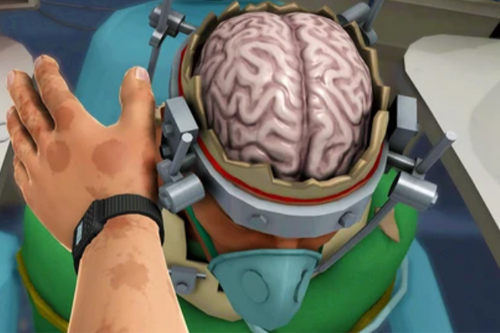
Brain surgery
Brain surgery is a complex medical procedure performed to treat conditions affecting the brain. These procedures range from removing tumors and alleviating pressure to addressing neurological disorders. As medical technology advances, brain surgeries have become safer and more effective, improving patient outcomes.
At the forefront of neurosurgical care in Nagpur, Maharashtra, is the Neurosys Multispeciality Centre, led by Dr. Ritesh Nawkhare. With over a decade of experience, Dr. Nawkhare specializes in various neurosurgical procedures, offering comprehensive care to patients with diverse neurological conditions.
What is Brain Surgery?
Brain surgery, also known as neurosurgery, involves the surgical treatment of conditions affecting the brain, spinal cord, and nervous system. It is performed by highly specialized neurosurgeons using advanced techniques, including minimally invasive procedures and robotic-assisted surgery.
Why is Brain Surgery Needed?
- Removal of brain tumors
- Treatment of brain aneurysms
- Repairing skull fractures or head trauma
- Managing epilepsy and seizures
- Removing blood clots (hematomas)
- Treating hydrocephalus (fluid buildup in the brain)
- Correcting congenital brain defects
Types of Brain Surgery
1. Craniotomy
- Tumor removal
- Aneurysm repair
- Clot removal
- Brain trauma treatment
2. Endoscopic Brain Surgery
- Pituitary tumors
- Hydrocephalus
- Skull base tumors
3. Stereotactic Radiosurgery
- Small tumors
- Arteriovenous malformations (AVMs)
- Trigeminal neuralgia
4. Deep Brain Stimulation (DBS)
- Parkinson’s disease
- Epilepsy
- Obsessive-compulsive disorder (OCD)
5. Brain Biopsy
- Brain cancer
- Infections
- Inflammatory diseases
6. Epilepsy Surgery
- Lobectomy (removal of a brain lobe)
- Corpus callosotomy (cutting nerve connections between brain hemispheres)
- Hemispherectomy (removal of one hemisphere in severe cases)
Conditions Treated with Brain Surgery
- Brain Tumors: Both benign and malignant tumors require surgical removal.
- Stroke: Surgery can help remove clots and restore blood flow.
- Aneurysms: Surgical clipping or coiling helps prevent rupture.
- Traumatic Brain Injury (TBI): Surgery is essential to relieve pressure and repair damage.
- Hydrocephalus: A shunt placed is to drain excess cerebrospinal fluid.
- Parkinson’s Disease: DBS helps manage symptoms effectively.
- Epilepsy: Resective surgery or vagus nerve stimulation can reduce seiz
Preparing for Brain Surgery
- Medical Evaluation: Blood tests, imaging scans (MRI, CT), and neurological exams.
- Medication Management: Adjusting medications to prevent complications.
- Fasting: Patients may need to avoid food and drink before surgery.
- Anesthesia Consultation: Discussing the type of anesthesia to be used.
- Psychological Support: Addressing anxiety and concerns with counseling.
Brain Surgery Procedure
- Medical Evaluation: Blood tests, imaging scans (MRI, CT), and neurological exams.
- Medication Management: Adjusting medications to prevent complications.
- Fasting: Patients may need to avoid food and drink before surgery.
- Anesthesia Consultation: Discussing the type of anesthesia to be used.
- Psychological Support: Addressing anxiety and concerns with counseling.
Risks and Complications
- Infection: Despite sterile techniques, there is a risk of infection at the incision site or within the brain.
- Bleeding: Blood vessels may be damaged during surgery, leading to hemorrhage.
- Neurological Deficits: Depending on the area of the brain involved, there may be temporary or permanent impairments in speech, movement, or cognition.
- Swelling: Postoperative cerebral edema can increase intracranial pressure, requiring medical management.
- Seizures: Surgery can induce seizures, necessitating anticonvulsant therapy.
Recovery and Rehabilitation
Recovery from brain surgery varies based on the procedure and individual patient factors. Generally, the recovery process includes:
- Hospital Stay: Patients may spend several days in the hospital, with initial care in an intensive care unit.
- Rehabilitation: Physical, occupational, and speech therapy may be necessary to regain lost functions and promote independence.
- Follow-Up Care: Regular appointments with the neurosurgeon to monitor progress, manage medications, and address any concerns.
- Lifestyle Adjustments: Patients are advised to gradually resume activities, avoid heavy lifting, and adhere to guidelines provided by Contact Us
Conclusion
Recovery from brain surgery varies based on the procedure and individual patient factors. Generally, the recovery process includes:
- Hospital Stay: Patients may spend several days in the hospital, with initial care in an intensive care unit.
- Rehabilitation: Physical, occupational, and speech therapy may be necessary to regain lost functions and promote independence.
- Follow-Up Care: Regular appointments with the neurosurgeon to monitor progress, manage medications, and address any concerns.
- Lifestyle Adjustments: Patients are advised to gradually resume activities, avoid heavy lifting, and adhere to guidelines provided by Schedule your Consultation with Dr. Ritesh Nawkhare
